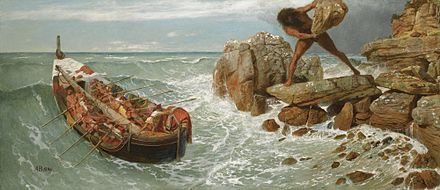Cyclops – Wikipedia
A wikipedia article, free l’encyclopéi.
The cyclops (in ancient Greek Cyclops / Puddle ) is a satyric drama of Euripides, probably written around 424 or 425 BC. J.-C [ first ] . This is the only example of this ancient kind to have survived. He deals with the episode of Ulysses winner of the Cyclops.
The date of creation of Cyclops is uncertain. Georg Kaibel estimated that the play was probably a work of youth of Euripides, prior to all his tragedies (therefore prior to Alceste dated 431 BC) [ 2 ] Due to the presence in the play of themes present in Alceste and the Hécube but developed in a less skillful way. Louis Meridier identifies resemblance between the room and The knights And The Raiders of Aristophanes considering the piece as prior to Cavaliers (dated 424 BC) [ 3 ] .

Characters [ modifier | Modifier and code ]
Plan [ modifier | Modifier and code ]
The room is cut into ten parts and describes the meeting between Ulysses and Polypheme during the Odyssey.
- I. Silène, the choir, Ulysses.
- II. Silène, the choir, polypheme.
- III. Silène, the choir, polypheme, Ulysses.
- IV. the choir.
- V. Ulysse.
- VI. Silène, the choir, Ulysses, polypheme.
- VII. The choir, Ulysses.
- VIII. The choir, Ulysses.
- IX. The choir, polypheme.
- X. The choir, Ulysses, polypheme.
Argument [ modifier | Modifier and code ]
The scene opens onto the character of Silene coming out of a cave. He says that after having always been alongside Dionysos, he was separated by the anger of Hera, who unleashed a people against Dionysos, the cyclops, so that they would sell it in the distance. Silène then went to sea in search of her boys who form the choir of satyrs; They agreed on the Etna where the cyclops, son of Poseidon and people of shepherds live, among which is Polypheme, the one they now serve and of which they keep the herd of sheep.
Ulysse, who asks the satyrs we sell for food for him and his companions who have just accosted, arises. Ulysse, who tries to find food for his crew, sells the liquor of Dionysos, an intoxicating and sleeping wine that Maron, the son of Dionysos, had offered him in an extra that fills up, in exchange for meat and cheese that belongs to the cyclops.
Polyphemus appears during the exchange between Ulysses and Silène, who orders Ulysses and his companions to hide in the cave, but betrays them by telling the cyclops that foreigners tried to steal his food and plotted to kill him. Ulysses defends himself but the cyclops eats two of his companions. Polypheme imprisoned the rest of the crew, planning to eat it because the meat of the sheep no longer suits it.
Ulysses uses a cunning to deceive the cyclops and allow his companions and himself to run away. He presents himself to the cyclops as a man by the name of anyone, who brings him wine, whose cyclops are naturally fond. The cyclops lets itself be taken by the cunning of Ulysses and accepts the liqueur of Dionysos, promising in Ulysses that he will be the last to be eaten. Ulysses makes him drink the wine in large quantities, not only to ensure his unconsciousness but also because he must be the only one to drink it: the other cyclops would be able to cause a confrontation for this wine.
The Cyclops falls asleep and Ulysses urges the satyrs to come and help him drive a burning stake in the unique eye of the cyclops. They claim to suffer and start to be limited; They encourage Ulysses only through singing. Ulysse bursts the eye of the cyclops, which comes out of his state of intoxication. Drunk with rage, Polypheme seeks to devour the entire crew. But the companions of Ulysses manage to escape from the cave.
Polypheme then calls his cyclops companions to help. They ask him who attacked him, and Polypheme answers them with anger: “It’s nobody! It is nobody who burst my eye!”. The other cyclops think so crazy and don’t care about it anymore. The corypheus then laughs at the blinded cyclops and has fun with the name of the person that Ulysse gave himself before the cyclops by cunning.
The satyrs finally integrate the crew of Ulysses, which continues its trip, and promise to serve Dionysos now.
In 2011, the play was staged in the form of an opera-rock: ” Cyclops: A Rock Opera »Played at the Pasadena Playhouse (Pasadena) [ 4 ] .
The cyclops is staged in 2012 by Christian Esnay alongside 3 other pieces: Hecube , Hélène And Oreste [ 5 ] .
In 2013, Stanford students translated the Greek play and stage it in a modern and urban environment. Ulysses and his crew are embodied by members of a music group who are kidnapped in the mansion of a Hollywood personality [ 6 ] .
- Henri Grégoire, ” The date of the Euripides cyclops », Classic antiquity , , p. 269-286 ( read online )
- (of) Georg Kaibel, ‘ Kratinos and Euripides » , Hermes (Philology Review) , vol. XXX, , p. 82
- Louis Meridier, The cyclops (notice) , Paris, p. 15
- Charles McNulty, « Theater review: ‘Cyclops: A Rock Opera’ at the Carrie Hamilton Theatre », Los Angeles Times , ( read online )
- ‘ Four pieces of Euripides », The Parisian , ( read online ) .
- (in) Veronica Marian, ‘ Stanford Classics in Theater brings the mishaps and mania of Euripides’ The Cyclops to Hollywood » , Stanford News , ( read online )
Recent Comments